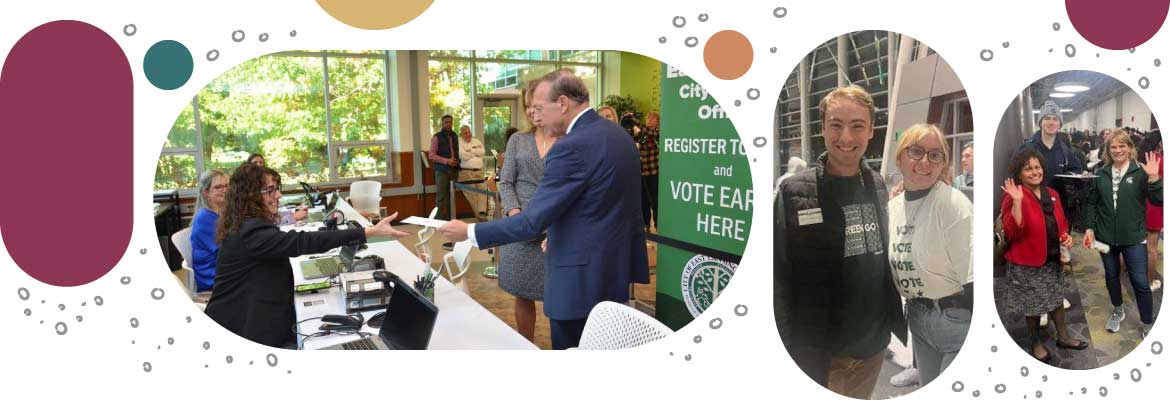Center for Community Engaged Learning Highlights
For the 2022-2023 academic year, there were
23,909 student community-engaged learning registrationsFor the 2022-2023 academic year, there were 23,909 student community-engaged learning registrations. Of those registrations, 25% (6,036) were in community-engaged learning as part of an academic course or program and 75% (17,873) were in co-curricular community service and engagement.
This information is reported by MSU faculty, staff, and student leaders through the MSU Community-Engaged Learning Survey administered annually by the Center for Community Engaged Learning.
➜ back to top

Michigan State University was ranked No. 2 in service-learning among public institutions by U.S. News and World Report (2023 edition of Best Colleges).

MSUvote
During the 2022-2023 academic year, the MSUvote initiative worked to increase democratic engagement and voter participation on Michigan State University's campus. MSUvote is comprised of students, faculty, staff, and community members who collaborate to increase the number of registered student voters, inform and educate students on candidates and issues, and bolster student participation on Election Day.
MSUvote coordinated with the City of East Lansing Clerk to host on-campus satellite offices where students could register and cast their ballot leading up to the 2022 midterm elections. As a result of their efforts, Spartans turned out in large numbers on Election Day 2022, many of them taking advantage of same-day registration at the Brody Precinct on MSU's campus. Multiple partner organizations and volunteers provided refreshments to students waiting in line to register.
MSUvote plans robust educational workshops leading up to the 2024 presidential election and will provide ample resources and events for Spartans to learn how to be democratically engaged. Plans are also underway for a fall 2023 Student Caucus, which will foster dialogue across political affiliations and promote student-led voter engagement efforts.
➜ back to top
Cohort Programs and Student Success at MSU:
Community Engagement Scholars Program

The Michigan State University Community Engagement Scholars Program (CESP) celebrated its seventh year in 2022-2023! CESP is a partnership between the Center for Community Engaged Learning (CCEL) and the MSU Office of the President. It was established in 2016 with the main goal of connecting MSU students with community partners in the Detroit area to engage in meaningful economic and community development projects. Program staff were excited to spend time this year reflecting on the program's history, impact, and future.
During the 2016-2017 pilot year of the program, 10 MSU students were partnered with Midtown Detroit, Inc. (MDI). CESP students spent 8-10 hours a week in Detroit supporting MDI projects related to affordable housing, small business attraction and support, green space and parks, and neighborhood development. Student scholars also participated in cohort meetings and professional development led by the program director and a graduate program coordinator. These cohort sessions were designed to assure that students were learning about community engagement scholarship, community and economic development, team building, social justice, and project management. The cohort space also provided an opportunity for personal and professional development and reflective practice.
In an effort to bring together community-engaged learning and cohort programming, and to remove barriers to student participation, national service models and other community-based scholar programs were explored. The MSU Community Engagement Scholars Program was modeled after the national AmeriCorps VISTA program and the Bonner Scholar Program. In the years to follow, the program evolved to allow student scholars to be partnered with additional partners in the Detroit, Lansing, and Flint communities, like Crim Fitness Foundation (Flint); Mayor of Detroit Office; Allen Neighborhood Center (Lansing); and Refugee Development Center (Lansing).
Since CESP's inception, a level of formal program assessment has occurred. From 2020-present, the program has had standardized assessment points revolving around understanding “Belonging and Community,” “Professional Development and Individual Values Development,” and “Social, Civic, and Political Engagement.” Over the years, the majority of respondents agreed with all statements regarding belonging, support, and engagement in the cohort. CESP creates space for reflective learning and discussion of values. Central to the scholars program have been professional development workshops and skills development revolving around communicating community engagement experiences in resumes and cover letters, developing empowerment perspectives, and well-being/boundary-setting. Responses to the surveys indicate positive experiences in regard to social, civic, and political engagement experiences and attitudes, reflecting respondents' motivation to work for the betterment of communities and to engage with political processes in the future.
While the original goals of the CESP experience were to connect MSU students with community partners in the Detroit area in order to engage in meaningful economic and community development projects, the goals and impact of the program have since expanded to include the development of students' sense of belonging, personal and professional development, as well as the promotion of social, civic, and political engagement. CESP has expanded its geographical impact with a broader range of community partners and has had a meaningful impact on student participants' overall success. The cohort approach to CESP is an important factor in the success of the student experience.
Moving forward, CESP facilitators will work to deepen and nuance the program's focus on social justice. CESP will focus on a scaffolded experience for scholars who apply and are chosen to continue their participation for multiple program years. Finally, CESP hopes to increase funding in order to expand the program to 100 student scholars, 10 graduate student coordinators, a dedicated program director, and five communities (50-75 community partners). The impact that the CESP model has on students and communities is significant, and we hope to increase access and reach for all participants.
➜ back to top
What's better than 2 AmeriCorps VISTA members? 3!
That's right, the Center for Community Engaged Learning was able to take on two VISTAs for 2023. Then we made room for three!
 Chloe Kwiecien is one of the AmeriCorps VISTAs serving the Center for Community Engaged Learning. She is working to establish a network of campus partners to promote student engagement in the community and help build capacity within the center. During her time at CCEL, she hopes to help increase volunteer opportunities for students at MSU and gain experience working in the nonprofit sector. Chloe graduated from Michigan State University in December of 2022 with a bachelor's degree in communication.
Chloe Kwiecien is one of the AmeriCorps VISTAs serving the Center for Community Engaged Learning. She is working to establish a network of campus partners to promote student engagement in the community and help build capacity within the center. During her time at CCEL, she hopes to help increase volunteer opportunities for students at MSU and gain experience working in the nonprofit sector. Chloe graduated from Michigan State University in December of 2022 with a bachelor's degree in communication.
 Juliet McKaig is a recent graduate of Michigan State University, where she majored in international relations at James Madison College and minored in German. She says that working with AmeriCorps VISTA is a great opportunity, as she has been preparing for a life of service work to improve the communities around her. With her current position at the MSU Center for Community Engaged Learning, Juliet is able to refine those skills and long-term goals, while serving the academic community that she has been a part of for the past three years.
Juliet McKaig is a recent graduate of Michigan State University, where she majored in international relations at James Madison College and minored in German. She says that working with AmeriCorps VISTA is a great opportunity, as she has been preparing for a life of service work to improve the communities around her. With her current position at the MSU Center for Community Engaged Learning, Juliet is able to refine those skills and long-term goals, while serving the academic community that she has been a part of for the past three years.
 Eternity Burton-George graduated from Michigan State University in 2021 with a bachelor's degree in human biology. Eternity has volunteered with many different organizations, such as Child and Family Charities, Read to Succeed, and Big Brothers Big Sisters. She hopes to use her skills at MSU's Center for Community Engaged Learning to increase students' interest in volunteering in the community. After her service term, she plans to pursue a graduate degree in public health specializing in health behavior and health education.
Eternity Burton-George graduated from Michigan State University in 2021 with a bachelor's degree in human biology. Eternity has volunteered with many different organizations, such as Child and Family Charities, Read to Succeed, and Big Brothers Big Sisters. She hopes to use her skills at MSU's Center for Community Engaged Learning to increase students' interest in volunteering in the community. After her service term, she plans to pursue a graduate degree in public health specializing in health behavior and health education.
During their time with CCEL, all three AmeriCorps VISTAs will be working on projects and programs helping the center enhance its capacity for engaging young adults and various community partners in service and volunteerism.
Chloe and Juliet's year of service will end in mid-January 2024, while Eternity's year of service will end in late October 2023.
➜ back to top


